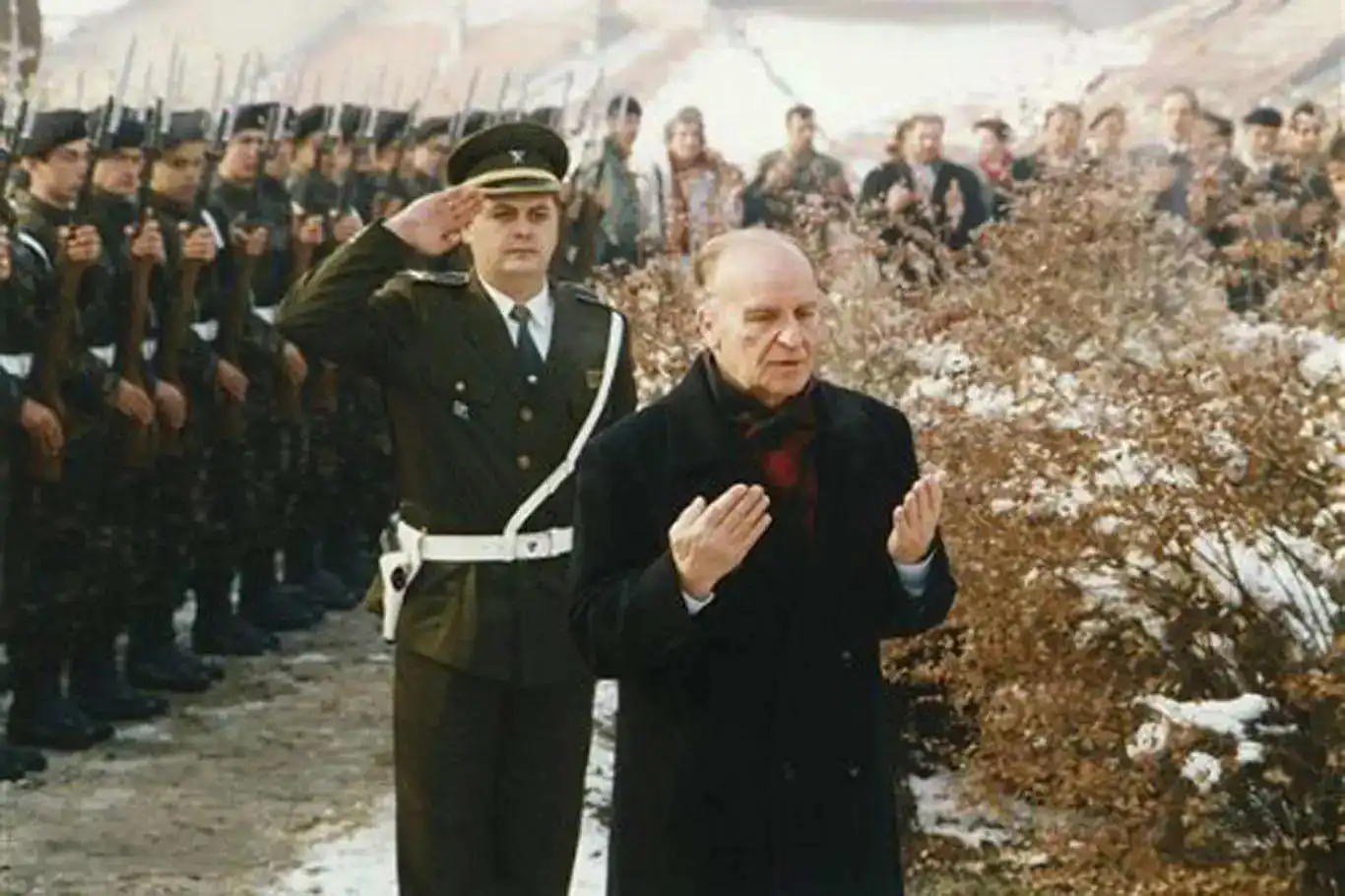Remembering Alija Izetbegović: 22 years since the passing of Bosnia’s Islamic leader


Today marks the 22nd anniversary of the passing of Alija Izetbegović, the revered first president of independent Bosnia-Herzegovina, whose life and legacy continue to inspire Muslims and advocates of justice worldwide.
Known as the "Wise King," Izetbegović’s unwavering commitment to his faith, his people, and the cause of Bosnian independence cemented his place as a towering figure in modern Islamic and global history.
Born on August 8, 1925, in Bosanski Šamac, Izetbegović grew up in a devout Muslim family, immersing himself in Islamic teachings from a young age. By six, he was studying the Qur’an and attending morning prayers at the mosque, laying the foundation for a life guided by faith and principle. Despite living in a Europe often hostile to Muslims, whom many viewed as outsiders, Izetbegović’s early years instilled in him a deep sense of duty to his religion and community.
At just 16, Izetbegović founded the Young Muslim Club (Mladi Muslimani), a platform for young Bosnians to explore Islamic teachings. This organization quickly grew into a vital force for education and charity, particularly during the turmoil of World War II, when the German invasion of Yugoslavia unleashed horrific violence. The massacre of 100,000 Bosnian Muslims by Serb Chetniks profoundly shaped Izetbegović’s resolve to defend his people’s rights and dignity, a commitment that would define his life.
Following Yugoslavia’s independence in 1946, the Communist regime targeted Muslims, and Izetbegović became a primary focus of their oppression due to his outspoken advocacy for Islamic values. At 24, he was sentenced to five years in prison for his religious activities, yet his spirit remained unbroken. In 1970, he penned The Islamic Declaration, a seminal work outlining a vision for a society rooted in Islamic principles, emphasizing justice, morality, and human dignity. This manifesto, both visionary and controversial, led to his arrest in 1983 alongside 12 other Muslim intellectuals. Charged with subversive activities tied to the Young Muslim Club, he was sentenced to 14 years in prison. Undeterred, Izetbegović’s writings from this period continued to inspire hope and resistance among Bosnian Muslims.
Released in 1989 amid Yugoslavia’s dissolution, Izetbegović republished The Islamic Declaration, which became a beacon of political and spiritual stability. In 1990, he was elected president of Bosnia-Herzegovina’s joint administration, stepping into leadership as the country faced fragmentation. His presidency coincided with the brutal Bosnian War (1992–1995), during which he led his nation through unimaginable horrors, including the Srebrenica massacre, where over 8,000 Bosnian Muslims were killed in a genocidal campaign. Izetbegović’s leadership was marked by his tireless pursuit of peace, justice, and the preservation of Bosnian Muslim identity, even as he navigated complex international diplomacy and relentless aggression.
Beyond his political role, Izetbegović was a prolific thinker and writer. His book Islam Between East and West (1984) offered a profound exploration of Islamic thought in the context of global ideologies, earning him recognition as a leading Muslim intellectual. His writings emphasized the compatibility of Islam with modernity, advocating for a balanced society that upholds faith while embracing progress. His intellectual contributions extended to his speeches, where he often spoke of unity, resilience, and the moral imperative to resist oppression—messages that resonated far beyond Bosnia’s borders.
Izetbegović’s commitment to his people was not without personal sacrifice. He endured years of imprisonment, vilification, and the immense pressures of leading a nation under siege. Yet, his humility and wisdom earned him the title of the "Wise King" among his people. His ability to bridge Islamic values with universal principles of justice made him a global symbol of resistance against tyranny.In 2000, health issues forced Izetbegović to retire from the presidency and his leadership of the Party of Democratic Action (SDA), which he had founded. On September 10, 2003, a fall resulting in broken ribs and internal bleeding led to his hospitalization. On October 19, 2003, Alija Izetbegović passed away in Sarajevo at the age of 78, leaving behind a legacy of courage, faith, and unwavering dedication.
Today, as we commemorate the 22nd anniversary of his passing, Izetbegović’s legacy endures as a source of inspiration for Muslims and all who champion justice. His life exemplified the power of faith to overcome adversity, and his leadership laid the foundation for Bosnia-Herzegovina’s survival as a sovereign nation. Across the Muslim world, his name remains synonymous with resilience, intellectual rigor, and the relentless pursuit of dignity.
In Sarajevo, annual commemorations, including prayers and gatherings at his grave, reflect the deep reverence Bosnians hold for their founding father. His vision for a pluralistic, faith-guided society continues to guide Bosnia’s aspirations for peace and unity. As the Muslim world reflects on his contributions, Alija Izetbegović stands as a timeless example of how faith, intellect, and courage can shape a nation and inspire generations.“
My faith is my strength, and my struggle is for justice,” Izetbegović once said. On this solemn anniversary, we honor a man whose life embodied these words, a leader whose legacy as the Wise King will forever illuminate the path toward justice and peace. (ILKHA)
LEGAL WARNING: All rights of the published news, photos and videos are reserved by İlke Haber Ajansı Basın Yayın San. Trade A.Ş. Under no circumstances can all or part of the news, photos and videos be used without a written contract or subscription.
The world-renowned Louvre Museum was temporarily closed on Sunday morning following a dramatic jewel heist that authorities described as one of the most audacious thefts in recent French history.
The head of the Network of Civil Society Organizations in Gaza, Amjad Al-Shawwa, issued a stark warning today about the escalating risk of famine in the Gaza Strip, as the Israeli authorities continue to keep the Rafah crossing closed.
Millions of Americans took to the streets on Saturday in coordinated “No Kings” protests, denouncing what organizers described as the authoritarian tendencies and corruption of President Donald Trump.